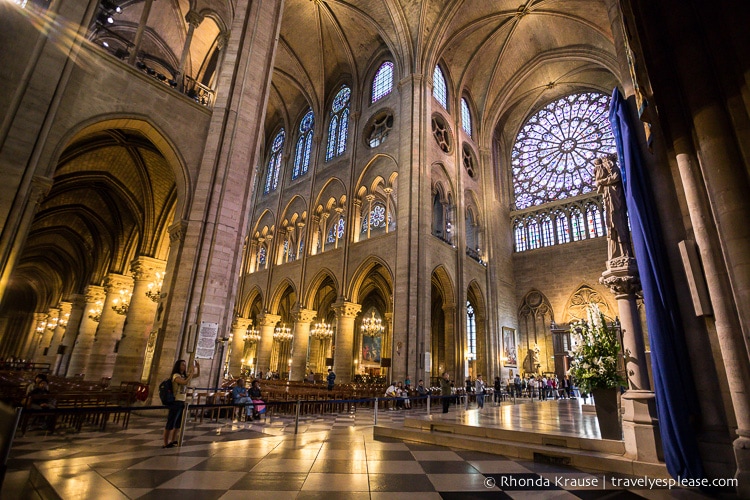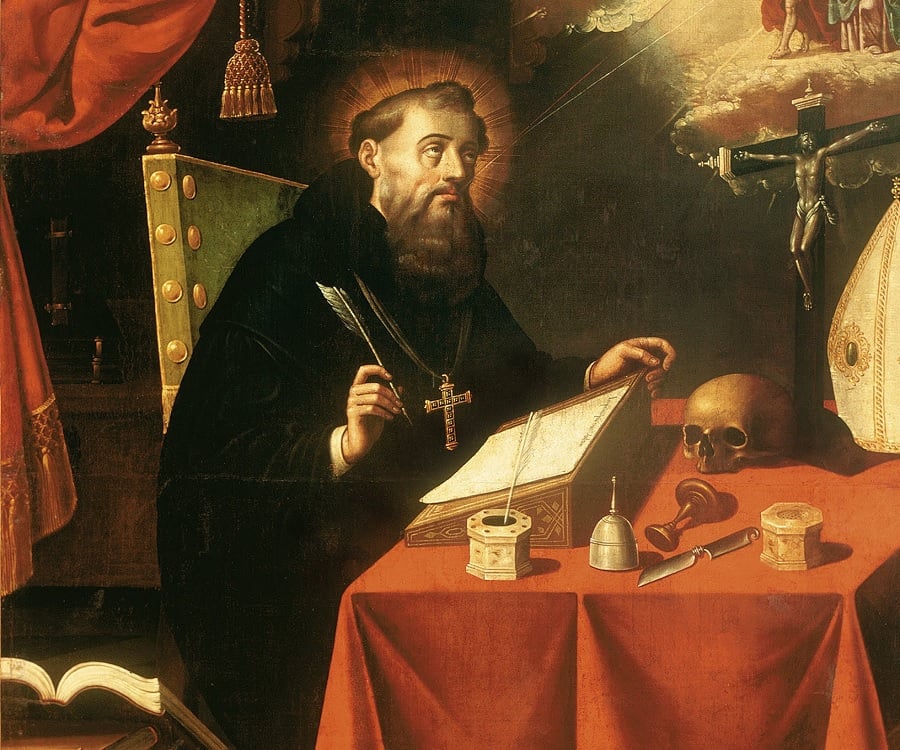 It was no different than any other Sunday at Notre Dame Cathedral as hundreds of people packed the most visited tourist attraction in Paris to get a glimpse of one Europe's most impressive and historic churches. Their intention for being there varies as much as any one of our motivations for visiting a particular place. For many it is just one more thing to check off the list of things to see in Paris, you know, take the picture, post it on Facebook, and be able to say "I went there". For others it may be more intentional. They may be interested in history in general and/or church architecture in particular. And still for others it may be out of a truly religious conviction, that is to visit a holy place and find nourishment therein. Regardless of one's intention, for those who happen be in Notre Dame Cathedral around 6:30 pm on a Sunday, they are in for a surprise.
It was no different than any other Sunday at Notre Dame Cathedral as hundreds of people packed the most visited tourist attraction in Paris to get a glimpse of one Europe's most impressive and historic churches. Their intention for being there varies as much as any one of our motivations for visiting a particular place. For many it is just one more thing to check off the list of things to see in Paris, you know, take the picture, post it on Facebook, and be able to say "I went there". For others it may be more intentional. They may be interested in history in general and/or church architecture in particular. And still for others it may be out of a truly religious conviction, that is to visit a holy place and find nourishment therein. Regardless of one's intention, for those who happen be in Notre Dame Cathedral around 6:30 pm on a Sunday, they are in for a surprise. |
|
Mgr Éric de Moulins Beaufort,
Auxiliary Bishop of Paris
|
For many of us, we enter these old buildings as we do any museum, excited to catch a glimpse of the past. We see them as interesting remanences of a time gone by. But for those at Notre Dame Cathedral this night, they were faced with something very different. They were confronted with what seemed to be a thing of the past---alive. That is, not only a Catholic church but the Catholic Church. And they were forced to encounter this in its fullest authority, a Catholic bishop, a direct descendant of the Apostles. I could see on people's faces the look that comes with trying to reconcile an encounter with something alive that was just before thought of as not anymore. As if they were at a wake and the eyes of the dead suddenly opened. But it was more than that. It wasn't just surprise that I witnessed, I saw awe in their eyes, they were humbled by it all, and some were even moved to reverence.
 |
| Tourists watch as Mass is celebrated in Cathédrale de Notre Dame de Paris |
 |
| St. Augustine |
Whether one will allow himself to make the connection between the awe they feel in the face of such an encounter , and the need for religion and God in his live will of course vary from person to person. Unfortunately, in an increasingly secular world in which we find ourselves, especially here in post-revolutionary France, such epiphanies are few and far between. So is the incoherence of the modern mind. But even if full conversion does not occur (and many times they do; there are countless accounts of people being converted after a visit to theses churches), one cannot but be challenged to think of things beyond this world, that is the divine, even if just for a moment in places like Notre Dame. With its imposing statues of Christ, the saints, Mary, along with breathtaking stain glass windows and soaring ceilings, one's mind cannot remain "in this world" for long. Nor can one remain spiritual unaffected, even for a moment, at the sight of witnessing a beautiful Mass, draped in all the pomp and circumstance one would expect to accompany a Cathedral Mass, not to mention coming face to face with a bishop imparting his apostolic blessing as he passes by, so humbly, lovingly-- and confidently.
Of course, an encounter with the divine is what all these cathedrals, churches, and monasteries were first created to provide. They are supposed to give us "a glimpse of heaven." They endeavor to raise the eyes of the souls of those who work in them, visit them, pray in them, are nourished by the Eucharist in them. While times are different, and the society in which we find ourselves does very little to cultivate an appetite for beauty- for God- as it often did when these places were first built, efforts to erase the yearning of the heart for that which they have always symbolized have always failed. I've heard it said that "modernism will fail for the same reason why tradition will prevail. Beauty endures." What is it about beauty that makes it endure? Beautiful things are but a reflection of the ultimate beauty we long for, beauty itself, that is God. Structures, images, pictures, and ceremony that reflect the divine will never cease to attract onlookers, will never cease to move the soul. While this search exists inside all of us, it is often mis-placed. We often look to ambition, money, sex, and prestige to satisfy this desire. Yet, we find in each one of these that they fail to satisfy man's search for meaning. With so many lives in disarray in our society today, suffering the malaise that comes from an absence of God and deep and fulfilling relationships, places like Notre Dame, and experiences of a beautiful Mass and the moving sight of a bishop blessing his people, have the potential of being all the more impactful. The confidence exuded by so many of these churches in Europe, of the Mass, and of the bishop, however, is intimidating to modern man, who believes, and who is told that nothing and no one is above him. But, at the same time, it resonates with the yearning one has for a leader, a father-- for God (we never cease to be like little children. We want the security of a good parent, without the restrictions they impose for our own good).
Through my many travels around Europe, visiting so many of the most sought after places to visit, I have often found myself pondering the impressive reality that many of these places are religious, and, more specifically, Catholic. Even in the secular societies in which we find ourselves today in Europe and the United States, we find it seemingly paradoxically the case that millions of people each year still seek out these places to visit. Here, the Church has a wonderful opportunity. An opportunity to let these works of marvel do what they were created to do when they were first built, remind people of the presence of God and His church, which exists to guide and nourish us in our journey to heaven. This reminder is one that is so needed in our world today. To remind people that what they entered and considered a relic of the past is indeed a present reality, a reality for which we all yearn. What I saw on Sunday night in the faces of tourists packed in Notre Dame Cathedral was an instance of this. It was an instance of modern man being challenged by the unexpected reminder of the reality that God and his Church prevails. A reality that is at once a relief for the soul, awe-inpiring in fact. But it is also a reality that is uncomfortable for many of us, especially today. For, after all, if there does exists an authority beyond this world, then I am not the author of my own reality and therefore cannot do whatever I desire. For this reason, experiences like the ones I saw had by many in Notre Dame will often remain external, nothing more than a "nice experience" which gave me a "good feeling", a Facebook post that got me a lot of likes (another good feeling), and allowed me to say "I visited there". Nevertheless, what I saw on many faces, that look of awe, was extremely sobering. It was yet another affirmation that truth and beauty does indeed endure.
Paris, France.




Well written John!
ReplyDeleteTruly a beautiful and awe-inspiring article, written by one I know to be a faithful and true.
ReplyDelete